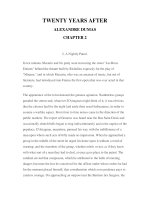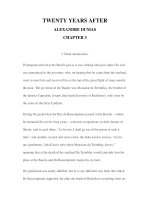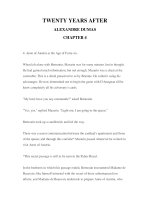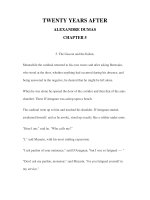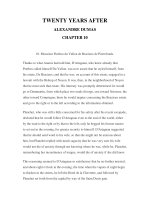LUYỆN ĐỌC TIẾNG ANH QUA CÁC TÁC PHẨM VĂN HỌC –TWENTY YEARS AFTER ALEXANDRE DUMAS CHAPTER 77 pdf
Bạn đang xem bản rút gọn của tài liệu. Xem và tải ngay bản đầy đủ của tài liệu tại đây (37.02 KB, 15 trang )
TWENTY YEARS AFTER
ALEXANDRE DUMAS
CHAPTER 77
77. The three Lieutenants of the Generalissimo.
The night was dark, but still the town resounded with those noises that disclose
a city in a state of siege. Athos and Aramis did not proceed a hundred steps
without being stopped by sentinels placed before the barricades, who demanded
the watchword; and on their saying that they were going to Monsieur de
Bouillon on a mission of importance a guide was given them under pretext of
conducting them, but in fact as a spy over their movements.
On arriving at the Hotel de Bouillon they came across a little troop of three
cavaliers, who seemed to know every possible password; for they walked
without either guide or escort, and on arriving at the barricades had nothing to
do but to speak to those who guarded them, who instantly let them pass with
evident deference, due probably to their high birth.
On seeing them Athos and Aramis stood still.
"Oh!" cried Aramis, "do you see, count?"
"Yes," said Athos.
"Who do these three cavaliers appear to you to be?"
"What do you think, Aramis?"
"Why, they are our men."
"You are not mistaken; I recognize Monsieur de Flamarens."
"And I, Monsieur de Chatillon."
"As to the cavalier in the brown cloak "
"It is the cardinal."
"In person."
"How the devil do they venture so near the Hotel de Bouillon?"
Athos smiled, but did not reply. Five minutes afterward they knocked at the
prince's door.
This door was guarded by a sentinel and there was also a guard placed in the
courtyard, ready to obey the orders of the Prince de Conti's lieutenant.
Monsieur de Bouillon had the gout, but notwithstanding his illness, which had
prevented his mounting on horseback for the last month that is, since Paris
had been besieged he was ready to receive the Comte de la Fere and the
Chevalier d'Herblay.
He was in bed, but surrounded with all the paraphernalia of war. Everywhere
were swords, pistols, cuirasses, and arquebuses, and it was plain that as soon as
his gout was better Monsieur de Bouillon would give a pretty tangle to the
enemies of the parliament to unravel. Meanwhile, to his great regret, as he said,
he was obliged to keep his bed.
"Ah, gentlemen," he cried, as the two friends entered, "you are very happy! you
can ride, you can go and come and fight for the cause of the people. But I, as
you see, am nailed to my bed ah! this demon, gout this demon, gout!"
"My lord," said Athos, "we are just arrived from England and our first concern
is to inquire after your health."
"Thanks, gentlemen, thanks! As you see, my health is but indifferent. But you
come from England. And King Charles is well, as I have just heard?"
"He is dead, my lord!" said Aramis.
"Pooh!" said the duke, too much astonished to believe it true.
"Dead on the scaffold; condemned by parliament."
"Impossible!"
"And executed in our presence."
"What, then, has Monsieur de Flamarens been telling me?"
"Monsieur de Flamarens?"
"Yes, he has just gone out."
Athos smiled. "With two companions?" he said.
"With two companions, yes," replied the duke. Then he added with a certain
uneasiness, "Did you meet them?"
"Why, yes, I think so in the street," said Athos; and he looked smilingly at
Aramis, who looked at him with an expression of surprise.
"The devil take this gout!" cried Monsieur de Bouillon, evidently ill at ease.
"My lord," said Athos, "we admire your devotion to the cause you have
espoused, in remaining at the head of the army whilst so ill, in so much pain."
"One must," replied Monsieur de Bouillon, "sacrifice one's comfort to the public
good; but I confess to you I am now almost exhausted. My spirit is willing, my
head is clear, but this demon, the gout, o'ercrows me. I confess, if the court
would do justice to my claims and give the head of my house the title of prince,
and if my brother De Turenne were reinstated in his command I would return to
my estates and leave the court and parliament to settle things between
themselves as they might."
"You are perfectly right, my lord."
"You think so? At this very moment the court is making overtures to me;
hitherto I have repulsed them; but since such men as you assure me that I am
wrong in doing so, I've a good mind to follow your advice and to accept a
proposition made to me by the Duc de Chatillon just now."
"Accept it, my lord, accept it," said Aramis.
"Faith! yes. I am even sorry that this evening I almost repulsed but there will
be a conference to-morrow and we shall see."
The two friends saluted the duke.
"Go, gentlemen," he said; "you must be much fatigued after your voyage. Poor
King Charles! But, after all, he was somewhat to blame in all that business and
we may console ourselves with the reflection that France has no cause of
reproach in the matter and did all she could to serve him."
"Oh! as to that," said Aramis, "we are witnesses. Mazarin especially "
"Yes, do you know, I am very glad to hear you give that testimony; the cardinal
has some good in him, and if he were not a foreigner well, he would be more
justly estimated. Oh! the devil take this gout!"
Athos and Aramis took their leave, but even in the ante-chamber they could still
hear the duke's cries; he was evidently suffering the tortures of the damned.
When they reached the street, Aramis said:
"Well, Athos, what do you think?"
"Of whom?"
"Pardieu! of Monsieur de Bouillon."
"My friend, I think that he is much troubled with gout."
"You noticed that I didn't breathe a word as to the purpose of our visit?"
"You did well; you would have caused him an access of his disease. Let us go to
Monsieur de Beaufort."
The two friends went to the Hotel de Vendome. It was ten o'clock when they
arrived. The Hotel de Vendome was not less guarded than the Hotel de
Bouillon, and presented as warlike an appearance. There were sentinels, a guard
in the court, stacks of arms, and horses saddled. Two horsemen going out as
Athos and Aramis entered were obliged to give place to them.
"Ah! ah! gentlemen," said Aramis, "decidedly it is a night for meetings. We
shall be very unfortunate if, after meeting so often this evening, we should not
succeed in meeting to-morrow."
"Oh, as to that, sir," replied Chatillon (for it was he who, with Flamarens, was
leaving the Duc de Beaufort), "you may be assured; for if we meet by night
without seeking each other, much more shall we meet by day when wishing it."
"I hope that is true," said Aramis.
"As for me, I am sure of it," said the duke.
De Flamarens and De Chatillon continued on their way and Athos and Aramis
dismounted.
Hardly had they given the bridles of their horses to their lackeys and rid
themselves of their cloaks when a man approached them, and after looking at
them for an instant by the doubtful light of the lantern hung in the centre of the
courtyard he uttered an exclamation of joy and ran to embrace them.
"Comte de la Fere!" the man cried out; "Chevalier d'Herblay! How does it
happen that you are in Paris?"
"Rochefort!" cried the two friends.
"Yes! we arrived four or five days ago from the Vendomois, as you know, and
we are going to give Mazarin something to do. You are still with us, I
presume?"
"More than ever. And the duke?"
"Furious against the cardinal. You know his success our dear duke? He is
really king of Paris; he can't go out without being mobbed by his admirers."
"Ah! so much the better! Can we have the honor of seeing his highness?"
"I shall be proud to present you," and Rochefort walked on. Every door was
opened to him. Monsieur de Beaufort was at supper, but he rose quickly on
hearing the two friends announced.
"Ah!" he cried, "by Jove! you're welcome, sirs. You are coming to sup with me,
are you not? Boisgoli, tell Noirmont that I have two guests. You know
Noirmont, do you not? The successor of Father Marteau who makes the
excellent pies you know of. Boisgoli, let him send one of his best, but not such a
one as he made for La Ramee. Thank God! we don't want either rope ladders or
gag-pears now."
"My lord," said Athos, "do not let us disturb you. We came merely to inquire
after your health and to take your orders."
"As to my health, since it has stood five years of prison, with Monsieur de
Chavigny to boot, 'tis excellent! As to my orders, since every one gives his own
commands in our party, I shall end, if this goes on, by giving none at all."
"In short, my lord," said Athos, glancing at Aramis, "your highness is
discontented with your party?"
"Discontented, sir! say my highness is furious! To such a degree, I assure you,
though I would not say so to others, that if the queen, acknowledging the
injuries she has done me, would recall my mother and give me the reversion of
the admiralty, which belonged to my father and was promised me at his death,
well! it would not be long before I should be training dogs to say that there were
greater traitors in France than the Cardinal Mazarin!"
At this Athos and Aramis could not help exchanging not only a look but a smile;
and had they not known it for a fact, this would have told them that De
Chatillon and De Flamarens had been there.
"My lord," said Athos, "we are satisfied; we came here only to express our
loyalty and to say that we are at your lordship's service and his most faithful
servants."
"My most faithful friends, gentlemen, my most faithful friends; you have
proved it. And if ever I am reconciled with the court I shall prove to you, I hope,
that I remain your friend, as well as that of what the devil are their names
D'Artagnan and Porthos?"
"D'Artagnan and Porthos."
"Ah, yes. You understand, then, Comte de la Fere, you understand, Chevalier
d'Herblay, that I am altogether and always at your service."
Athos and Aramis bowed and went out.
"My dear Athos," cried Aramis, "I think you consented to accompany me only
to give me a lesson God forgive me!"
"Wait a little, Aramis; it will be time for you to perceive my motive when we
have paid our visit to the coadjutor."
"Let us then go to the archiepiscopal palace," said Aramis.
They directed their horses to the city. On arriving at the cradle from which Paris
sprang they found it inundated with water, and it was again necessary to take a
boat. The palace rose from the bosom of the water, and to see the number of
boats around it one would have fancied one's self not in Paris, but in Venice.
Some of these boats were dark and mysterious, others noisy and lighted up with
torches. The friends slid in through this congestion of embarkation and landed
in their turn. The palace was surrounded with water, but a kind of staircase had
been fixed to the lower walls; and the only difference was, that instead of
entering by the doors, people entered by the windows.
Thus did Athos and Aramis make their appearance in the ante-chamber, where
about a dozen noblemen were collected in waiting.
"Good heavens!" said Aramis to Athos, "does the coadjutor intend to indulge
himself in the pleasure of making us cool our hearts off in his ante-chamber?"
"My dear friend, we must take people as we find them. The coadjutor is at this
moment one of the seven kings of Paris, and has a court. Let us send in our
names, and if he does not send us a suitable message we will leave him to his
own affairs or those of France. Let us call one of these lackeys, with a demi-
pistole in the left hand."
"Exactly so," cried Aramis. "Ah! if I'm not mistaken here's Bazin. Come here,
fellow."
Bazin, who was crossing the ante-chamber majestically in his clerical dress,
turned around to see who the impertinent gentleman was who thus addressed
him; but seeing his friends he went up to them quickly and expressed delight at
seeing them.
"A truce to compliments," said Aramis; "we want to see the coadjutor, and
instantly, as we are in haste."
"Certainly, sir it is not such lords as you are who are allowed to wait in the
ante-chamber, only just now he has a secret conference with Monsieur de
Bruy."
"De Bruy!" cried the friends, "'tis then useless our seeing monsieur the
coadjutor this evening," said Aramis, "so we give it up."
And they hastened to quit the palace, followed by Bazin, who was lavish of
bows and compliments.
"Well," said Athos, when Aramis and he were in the boat again, "are you
beginning to be convinced that we should have done a bad turn to all these
people in arresting Mazarin?"
"You are wisdom incarnate, Athos," Aramis replied.
What had especially been observed by the two friends was the little interest
taken by the court of France in the terrible events which had occurred in
England, which they thought should have arrested the attention of all Europe.
In fact, aside from a poor widow and a royal orphan who wept in the corner of
the Louvre, no one appeared to be aware that Charles I. had ever lived and that
he had perished on the scaffold.
The two friends made an appointment for ten o'clock on the following day; for
though the night was well advanced when they reached the door of the hotel,
Aramis said that he had certain important visits to make and left Athos to enter
alone.
At ten o'clock the next day they met again. Athos had been out since six o'clock.
"Well, have you any news?" Athos asked.
"Nothing. No one has seen D'Artagnan and Porthos has, not appeared. Have you
anything?"
"Nothing."
"The devil!" said Aramis.
"In fact," said Athos, "this delay is not natural; they took the shortest route and
should have arrived before we did."
"Add to that D'Artagnan's rapidity in action and that he is not the man to lose an
hour, knowing that we were expecting him."
"He expected, you will remember, to be here on the fifth."
"And here we are at the ninth. This evening the margin of possible delay
expires."
"What do you think should be done," asked Athos. "if we have no news of them
to-night?"
"Pardieu! we must go and look for them."
"All right," said Athos.
"But Raoul?" said Aramis.
A light cloud passed over the count's face.
"Raoul gives me much uneasiness," he said. "He received yesterday a message
from the Prince de Conde; he went to meet him at Saint Cloud and has not
returned."
"Have you seen Madame de Chevreuse?"
"She was not at home. And you, Aramis, you were going, I think, to visit
Madame de Longueville."
"I did go there."
"Well?"
"She was no longer there, but she had left her new address."
"Where was she?"
"Guess; I give you a thousand chances."
"How should I know where the most beautiful and active of the Frondists was at
midnight? for I presume it was when you left me that you went to visit her."
"At the Hotel de Ville, my dear fellow."
"What! at the Hotel de Ville? Has she, then, been appointed provost of
merchants?"
"No; but she has become queen of Paris, ad interim, and since she could not
venture at once to establish herself in the Palais Royal or the Tuileries, she is
installed at the Hotel de Ville, where she is on the point of giving an heir or an
heiress to that dear duke."
"You didn't tell me of that, Aramis."
"Really? It was my forgetfulness then; pardon me."
"Now," asked Athos, "what are we to do with ourselves till evening? Here we
are without occupation, it seems to me."
"You forget, my friend, that we have work cut out for us in the direction of
Charenton; I hope to see Monsieur de Chatillon, whom I've hated for a long
time, there."
"Why have you hated him?"
"Because he is the brother of Coligny."
"Ah, true! he who presumed to be a rival of yours, for which he was severely
punished; that ought to satisfy you."
"'Yes, but it does not; I am rancorous the only stigma that proves me to be a
churchman. Do you understand? You understand that you are in no way obliged
to go with me."
"Come, now," said Athos, "you are joking."
"In that case, my dear friend, if you are resolved to accompany me there is no
time to lose; the drum beats; I observed cannon on the road; I saw the citizens in
order of battle on the Place of the Hotel de Ville; certainly the fight will be in
the direction of Charenton, as the Duc de Chatillon said."
"I supposed," said Athos, "that last night's conferences would modify those
warlike arrangements."
"No doubt; but they will fight, none the less, if only to mask the conferences."
"Poor creatures!" said Athos, "who are going to be killed, in order that Monsieur
de Bouillon may have his estate at Sedan restored to him, that the reversion of
the admiralty may be given to the Duc de Beaufort, and that the coadjutor may
be made a cardinal."
"Come, come, dear Athos, confess that you would not be so philosophical if
your Raoul were to be involved in this affair."
"Perhaps you speak the truth, Aramis."
"Well, let us go, then, where the fighting is, for that is the most likely place to
meet with D'Artagnan, Porthos, and possibly even Raoul. Stop, there are a fine
body of citizens passing; quite attractive, by Jupiter! and their captain see! he
has the true military style."
"What, ho!" said Grimaud.
"What?" asked Athos.
"Planchet, sir."
"Lieutenant yesterday," said Aramis, "captain to-day, colonel, doubtless, to-
morrow; in a fortnight the fellow will be marshal of France."
"Question him about the fight," said Athos.
Planchet, prouder than ever of his new duties, deigned to explain to the two
gentlemen that he was ordered to take up his position on the Place Royale with
two hundred men, forming the rear of the army of Paris, and to march on
Charenton when necessary.
"This day will be a warm one," said Planchet, in a warlike tone.
"No doubt," said Aramis, "but it is far from here to the enemy."
"Sir, the distance will be diminished," said a subordinate.
Aramis saluted, then turning toward Athos:
"I don't care to camp on the Place Royale with all these people," he said. "Shall
we go forward? We shall see better what is going on."
"And then Monsieur de Chatillon will not come to the Place Royale to look for
you. Come, then, my friend, we will go forward."
"Haven't you something to say to Monsieur de Flamarens on your own
account?"
"My friend," said Athos, "I have made a resolution never to draw my sword
save when it is absolutely necessary."
"And how long ago was that?"
"When I last drew my poniard."
"Ah! Good! another souvenir of Monsieur Mordaunt. Well, my friend, nothing
now is lacking except that you should feel remorse for having killed that
fellow."
"Hush!" said Athos, putting a finger on his lips, with the sad smile peculiar to
him; "let us talk no more of Mordaunt it will bring bad luck." And Athos set
forward toward Charenton, followed closely by Aramis.

